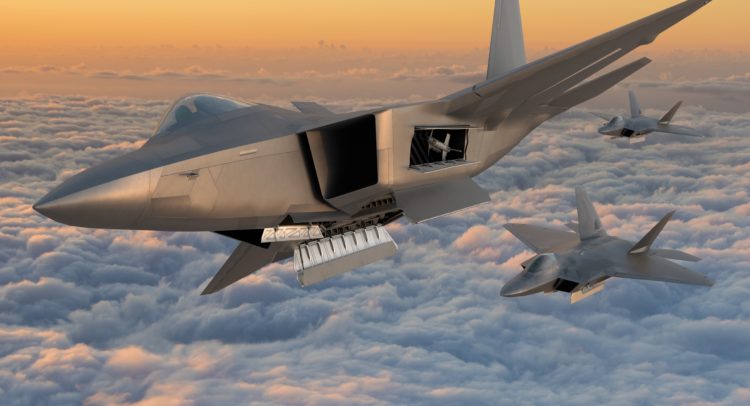Dividend growth investors have had a tough time lately. Even the highest-quality names out there are getting hammered these days, as earnings are likely to be compressed going forward amid raging inflation and a strong dollar. Even the best dividend growth stocks are likely to slow down the growth of their payouts. However, two stocks are likely to remain strong amid excellent earnings growth visibility: Lockheed Martin (NYSE:LMT) and General Dynamics (NYSE:GD). Accordingly, I am bullish on both names.
Meet Your ETF AI Analyst
- Discover how TipRanks' ETF AI Analyst can help you make smarter investment decisions
- Explore ETFs TipRanks' users love and see what insights the ETF AI Analyst reveals about the ones you follow.
However, to better understand the companies’ dividend growth prospects, let’s examine why their earnings are set to remain robust in the current market environment.
LMT and GD Stocks are Set to Produce Strong Earnings
While most sectors are being negatively impacted by the ongoing macroeconomic setup, including FX headwinds, the escalating war in Ukraine, and elevated energy costs, a few industries have benefited significantly. Lockheed Martin and General Dynamics are two major beneficiaries of the ongoing geopolitical mentions and are presently enjoying significant tailwinds.
For perspective, while the S&P 500 has declined over the past year, shares of Lockheed Martin Corporation and General Dynamics have returned 25% and 19%, respectively, excluding their underlying dividends.
It makes sense, after all, as the current market environment provides an excellent platform for both names to grow their earnings predictably over the next few years. Specifically, as Western allies continue to provide Ukraine with all kinds of weaponry and military equipment, both companies are well-positioned to benefit from the increased demand for their relevant products and services.
Specifically, the Armed Forces of Ukraine are currently making heavy use of Lockheed Martin’s PAC-3 and THAAD interceptor missiles, as well as armored combat support vehicles made by General Dynamics.
However, these tailwinds won’t be short-lived. Even if the unfortunate war were to be resolved tomorrow, Western allies would ultimately have to restock their arsenal following the continued weapons deliveries. This will result in a boosted backlog for Lockheed Martin and General Dynamics. For instance, the General Dynamics-made armored vehicles were delivered to Ukraine by Canada, and Canada will have to restock them.
For this reason, both companies are set to continue producing quite predictable and increasing revenues in the coming years. The cherry on top is that as a result of the current landscape, the DoD’s R&D budgets are anticipated to jump moving forward. Hence, we are looking at a multi-year supercycle for Lockheed Martin and General Dynamics.
Evidently, in its Q2 results, Lockheed Martin’s backlog came in at around $134.6 billion, suggesting that the company has secured roughly two years’ worth of future revenues. In the case of General Dynamics, the company’s current backlog stands at $87.6 billion. This means that its cash flows over the next two-to-three years have already been secured by its clients, presuming, of course, General Dynamics rises on occasion for these projects.
For these reasons, I believe that both Lockheed Martin and General Dynamics enjoy a clear pathway in terms of growing their earnings ahead. Accordingly, they should continue to sustain their already admirable dividend growth track records.
LMT and GD Stocks Have Solid Dividend Growth Prospects
Both Lockheed Martin’s and General Dynamics’ dividend growth track records have been exceptional while maintaining a comfortable payout ratio. This disciplined approach could easily allow both companies to continue growing their dividends.
In the case of Lockheed Martin, the company boasts a 19-year track record of consecutive annual dividend hikes, with its ten-year dividend-per-share CAGR (compound annual growth rate) standing at 12.55%. The company’s most recent quarterly dividend hike was by 7.7%. In addition, based on management’s Fiscal Year 2022 EPS outlook of $21.55, Lockheed’s payout ratio hovers close to a comfortable 52%.
General Dynamics features an even more outstanding dividend growth track record, featuring 27 years of successive annual dividend hikes. Accordingly, the company is a constituent of the S&P 500’s Dividend Aristocrat Index.
Despite such a mature dividend growth track record, General Dyncamics’ ten-year dividend growth CAGR of 9.82% displays the rapid pace of said hikes. While the most recent dividend hike was also by a lesser pace of 5.9%, there is plenty of room for the company to reaccelerate it. Consensus EPS estimates for the year average close to $12.16, implying a payout ratio of just around 41% for GD stock.
What are the Price Targets for LMT and GD Shares?
Turning to Wall Street, Lockheed Martin has a Hold consensus rating based on three Buys and nine Holds assigned in the past three months. At $472.33, the average Lockheed Martin stock forecast suggests a 14.8% upside potential.

While General Dynamics features a brighter Strong Buy consensus rating, which is based on six Buys and two Holds assigned in the past three months, its upside comes close to that of Lockheed Martin’s. Specifically, at $261.13, the average General Dynamics stock forecast implies a 15.7% upside potential.

Conclusion – LMT and GD Stocks Will Provide Secure Dividend Growth
Both Lockheed Martin Corporation and General Dynamics feature exceptional dividend growth track records already. Their yields stand at a notable 2.7% and 2.2%, respectively, as well. The two companies also feature ample room for their aggressive dividend hikes to continue, especially in the current market environment. As a result, dividend growth investors are likely two find these two names rather worthwhile.
















